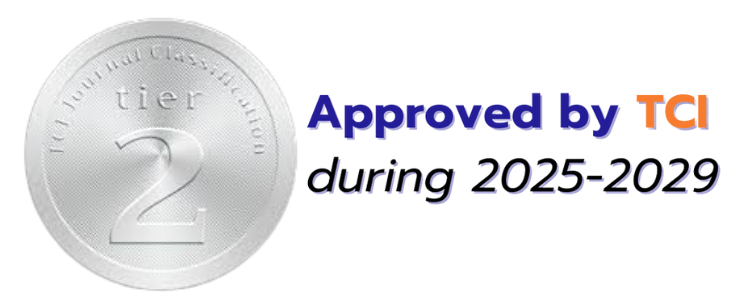Comparison of Competencies Based on Thai Qualifications Framework for Higher Education of Pre-service teachers between 5-year and 4-year Curriculum at the Faculty of Education and Development Sciences Kasetsart University Kamphaeng Saen Campus
Keywords:
Pre-service Teacher, Curriculum, Competencies Based on Thai Qualifications FrameworkAbstract
The purpose of this research was to compare the competencies according to the bachelor's degree qualification standards of teaching professional training pre-service teachers between the 5-year program and the 4-year program of the Faculty of Education and Development Sciences Kasetsart University Kamphaeng Saen Campus before and after training in the schools. The population consisted of 454 pre-service teachers of the Faculty of Education and Development Sciences Kasetsart University Kamphaeng Saen Campus in the 5-year program and 4-year program in the academic year 2022 and 460 mentor teachers. Data were collected by having students evaluate their own competencies in 3 phases and having mentor teachers evaluate their students after training. The additional interviews were conducted with the mentor teachers from 5 schools, totaling of 20 people. The result showed that the pre-service teachers in both teaching professional experience programs self-evaluated their competencies higher after the professional training and the self-evaluation after professional experience training for the 4-year program pre-service teachers were not different from those in the 5-year program. In addition, student competencies evaluated by mentor teachers in both programs at the end of the 2022 academic year, were at high level in all areas, and the competencies evaluated by mentor teachers after professional experience training for pre-service teachers in the 4-year program were no different from those in the 5-year program. However, the interviews with mentor teachers mentioned that pre-service teachers in the 5-year program showed better leadership and better companionship with students than those in the 4-year program.
Downloads
References
Accept bachelor’s degrees in all fields to compete for “Assistant Teacher.” (2560, March 20). Dailynews. (translated)
Andrew, M. (1990). Differences Between Graduates of 4-Year and 5-Year Teacher Preparation Programs. Journal of Teacher Education, 41(2), 45–51.
Chamchantharawong, C., Chanjarain, I., Suwanjinda, C., & Siririrth, W. (2017). Factors Affecting The Functional Competency of Teacher of Graduate Diploma Students in Teaching Profession at Chiangrai College. Veridian E-Journal, Silpakorn University, 10(1), 269–280.
Give in! The Ministry of Education has jointly resolved to open a teacher examination for 36 fields must have teacher license. Another 25 branches either have or not can take the exam. (2560, March 28). Khaosod Online. https://www.khaosod.co.th/breaking-news/news_273590 (translated)
Howard, G. S., & Dailey, P. R. (1979). Response-shift bias: A source of contamination of self-report measures. Journal of Applied Psychology, 64(2), 144–150. https://doi.org/10.1037/0021-9010.64.2.144
Jongchaloemchai, P., & Anuttato, J. (2023). A Study of Teaching Practice Competency of Pre-service Teachers in 4-Year and 5-Year Programs in Elementary Education of Faculty of Education, Nakhon Pathom Rajabhat University. Journal of Roi Kaensarn Academi, 8(5), 1–15.
Kwunsakul, K. (2017). The Study of Characteristics and Standard Competencies of Students Participating Teaching Professional Experience Intership from Educational Technology and Computer Education Program, Faculty of Education, Mahasarakham University Based on Opinion of Educa. Journal of Educational Measurement Mahasarakham University, 24(1), 31–53.
Latham, N., Mertens, S., & Hamann, K. (2015). A Comparison of Teacher Preparation Models and Implications for Teacher Attrition: Evidence from a 14-Year Longitudinal Study. School-University Partnerships, 8(2), 79–89.
Meekhun, S. (2548). Concise of Teachers and Educational Personal Council Act, 2003. Journal of Education, 16(2), 31–41.
Minister of Education set up a team to create a 4-year teacher curriculum for 30 Rajabhat schools, ready to create “excellent quality teachers.” (2561, November 2). Khaosod Online. (translated)
Ministry of Education adjusts teacher curriculum Rajabhat University to 4 years starting this academic year 2019. (2561, October 17). Khaosod Online. (translated)
Noymanee, N., & Aiemphaya, K. (2560). Development of Teacher Profession. Journal of Rajabhat Rajanagarindra University Graduate School, 1(1), 1–10.
Tannirat, T. (2010). Comparison of 4-Year and 5 Year Teacher Education Programs : A Multi-Research Method Study. Journal of Education, 21(3), 41–56.
Teachers’ council of Thailand. (2022). Objectives and Authority of the Teachers’ council of Thailand. https://www.ksp.or.th/ksp2018/objectives/ (translated)
Downloads
Published
Issue
Section
License
Copyright (c) 2024 วารสารศาสตร์การศึกษาและการพัฒนามนุษย์

This work is licensed under a Creative Commons Attribution-NonCommercial-NoDerivatives 4.0 International License.







